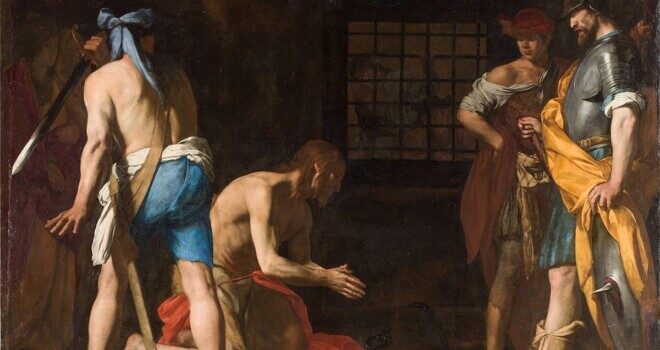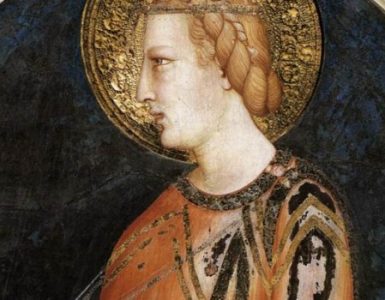The king said to the girl: “I will grant you whatever you ask of me, even to half of my kingdom.”
Notice anything strange about Herod’s words to his daughter? It is one thing to ask your children to hand you a list of the things they want for Christmas, but Herod tells his daughter that she can have anything. And to emphasize that he means, quite literally, “anything,” he further specifies: “even to half of my kingdom.” All that over a single dance? She must have accomplished one fantastic feat of acrobatic agility to elicit such an overzealous reaction in her father! The reality is that her performance was likely not much more exciting than that of any other child performing before her parents at a school recital. As a parent, Herod’s excitement at watching his daughter’s skill and achievement was warranted; his overexcitement was not. So how are we to make sense of it?
Herod, on his birthday, gave a banquet for his courtiers, his military officers, and the leading men of Galilee.
His daughter’s entertainment came at the end of a big party Herod had thrown for himself, in which he had invited “the leading men of Galilee.” Herod would have killed the fattest calf for the occasion and offered the choicest wine. There would have been plenty to eat…and drink. And certainly, Herod would have gone all out, celebrating and enjoying his birthday. The likelihood is that Herod would have been drunk. It may well have been his inebriation, and not his excitement, that led him to make such an outlandish offer to his young girl.
She went out and said to her mother, “What shall I ask for?”
Next we wonder, why did the girl run to mom for instructions on what to ask for? Why not just say to her father, “Okay, I’ll take half your kingdom then”? There are a few possibilities here, not the least of which is that Herod’s wife Herodias would have been a manipulative, narcissistic woman. We know that she was willing to manipulate her husband for her own personal gain, so it is not a stretch to imagine that she would have been willing to do the same to her daughter. This girl had been raised by a mother who would have spent the child’s lifetime whispering suggestions into her ear, making her feel guilty in the times she did not please her mother, and allowing her to feel wanted only when she did. Herod’s daughter was likely a soul in torment, one who never learned what it meant to be unconditionally loved by the ones who were supposed to love her most.
The girl hurried back to the king’s presence and made her request…
So Herod’s daughter “hurries” back. But this is not a child hurrying to Santa’s lap to ask for a new bicycle; this is someone hurrying to deliver a message of vengeance. What was her hurry? Why did she not take the time to ask her mother if she could ask for a brand-new chariot instead? Was she really so eager to acquiesce to her mother’s wishes that she gave absolutely no thought as to the opportunity she was missing by not asking for something for herself? Perhaps.
But there is a second possibility here. It is possible that Herod’s daughter was asking for something for herself. It is entirely likely that just as Herodias “harbored a grudge” against John the Baptist, so too is it conceivable that the daughter harbored a grudge against Herod. Her father was a man who liked to show off in front of his friends and obliged her to be the entertainment at his party. He ate too much, drank too much, and Herodias junior had spent a lifetime listening to her mother complain disdainfully about her husband and the company he kept. After being groomed in the school of contempt, there would have been no affection or fondness left in her heart for her father. Herod would have repulsed her.
He brought in the head on a platter and gave it to the girl. The girl in turn gave it to her mother.
The platter the child is holding in her hands is not a plate of hors d’oeuvres being passed around to the dinner guests; it is a man’s decapitated head. No matter how many beheadings she may have witnessed living in a culture in which this form of execution was rather common, how does a young girl get used to that? We can almost picture her proudly and gleefully handing it right over to her mother, awaiting a pat on the back. How would she have been able to remain so seemingly controlled in the face of something so macabre? She would have been able to do so only if the loathing in her heart had hardened it beyond recognition. When the young girl looked at the platter, she would not have seen injustice or violence. She would have seen victory.
When Herod learned of [mighty powers at work in Jesus], he said, “It is John whom I beheaded. He has been raised up.” (Mk 6:16)
It is this birthday scene which leads Herod to later conclude that Jesus must be John the Baptist, raised from the dead. It really is a startling conclusion—where would he get that idea? It is true that at this point, Jesus had already proved His ability to resurrect others, as He had raised Jairus’s daughter. But let’s remember, “He gave strict orders that no one should know this” (Mk 5:43), and even if one of the witnesses had let the cat out of the bag, Jesus’ authoritative word alone would have prevented anyone from fully understanding what had transpired. Yet somehow, Herod gets the idea that Jesus is not simply John’s “ghost,” but rather, John himself, flesh and blood. He believed something, which, for all intents and purposes, was impossible. Now we might imagine that Herod’s beliefs stemmed from the pagan practices of the culture in which he was raised; but let’s remember, “Herod feared John, knowing him to be a righteous and holy man,” and further, “when he heard him speak he was very much perplexed, yet he liked to listen to him.” Herod’s heart had been touched by truth; but the worldliness with which he “danced” prevented him from understanding it.
May we ourselves remain faithful to the voice of Truth, which can be heard only in the silence of our hearts. May we recognize it by the love it stirs within our souls, one which wipes away resentments, grudges, discontent, and fear. May it heal our wounds and soften our hearts, thereby allowing us to live in the sweet freedom of peace, no matter how challenging our circumstances…for it is a peace that can never be found in the things of this world. It is a peace that only the Lord can give.
Peace I leave with you; my peace I give to you. Not as the world gives do I give it to you. (Jn 14:27)
Stanzione, M. (1634). Beheading of St. John the Baptist [oil on canvas]. Retrieved from Wikimedia Commons.










